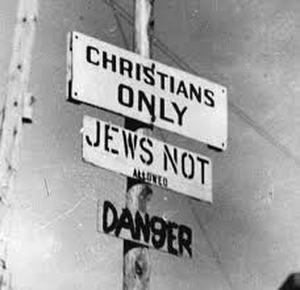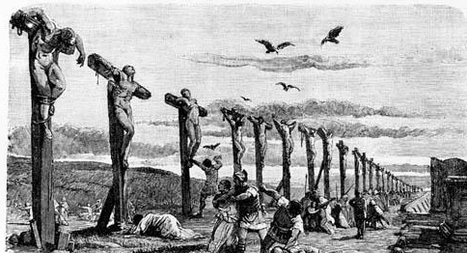|
4/29/2015 Comments Standing Amidst the Wrath of GodBy: Nichola Torbett  The wrath of God has been kindled and is pouring out of Baltimore in images of police cars on fire and CVS windows broken. It pours out of Baltimore as it poured out of Ferguson last summer. In the faces of chanting protestors there, I see the power of the life force refusing to be repressed any longer. The life of God is rising up and destroying the instruments of oppression like so many drowned Egyptian chariots. Praise God. Praise God, but I think if we’re honest, it makes a lot of us American Christians, and especially white American Christians like me, uncomfortable. And if ever we needed to be honest, it is now. In predominantly white progressive Christian circles, we are squeamish about this concept: the wrath of God. For instance, I have always wanted to celebrate the escape of the Hebrew slaves from Egypt while glossing over the drowning of the Egyptian soldiers in the Red Sea. After all, the Egyptian soldiers were people, too. Didn’t God care about them?
Comments
4/23/2015 Comments Resisting the Disposable CultureBy: Mark VanSteenwyk Note: This article originally appeared on Mark's blog Recently, Pope Francis has been issuing challenges to our capitalist system–how it nurtures exclusion, inequality, and death. He has gotten pushback from the likes of Rush Limbaugh for sounding like a Marxist. I am thankful that the Pope is using his pulpit this way. Here’s an example: How can it be that it is not a news item when an elderly homeless person dies of exposure, but it is news when the stock market loses two points? This is a case of exclusion. Can we continue to stand by when food is thrown away while people are starving? This is a case of inequality. Today everything comes under the laws of competition and the survival of the fittest, where the powerful feed upon the powerless. As a consequence, masses of people find themselves excluded and marginalized: without work, without possibilities, without any means of escape.  I agree with the Pope: what we see in our era of late modern consumer capitalism goes beyond conventional exploitation and oppression. The cost of human lives is now factored in as commodity; using up human lives–in wars or in factories–is a cost of doing business. We have entered a new era of disposable humanity. But it begs the question: What do we do about it? It is one thing to agree with the Pope and share his wisdom on Facebook, Twitter, or (for those stuck in 2004) the blogosphere. Beyond that, we may even try to influence our legislators when we feel stirred. But often such righteous passions are fleeting. How do we respond to the growing devaluing of human beings? Our first instinct, I suspect, is to distance ourselves from this process of dehumanization. We sympathize with the oppressed and cast off, but it has little to do with us. 4/14/2015 Comments Supersessionism, Jewish Whiteness, and Liberating Biblical Study in Post-Ferguson AmericaBy: Gregory Williams GregWilliams  “Well, the text seems to say that Christianity supersedes Judaism.” I gasped, as did everyone else in the area. Not only could I not believe that I was hearing these words, but I couldn’t believe who the speaker was, either. The context was my New Testament exegesis seminar on the Epistle to the Hebrews and the speaker was my friend, Jeremy. Jeremy (a black Methodist pastor) and I (an Ashkenazi Jewish Christian) had become friends during the past two years and were, in particular, allies in predominantly liberal white protestant classrooms where we endeavored, together, to raise issues of poverty, slavery, empire, and anti-Semitism in biblical texts and historic Christian theologies, constantly pushing our professors with our “resistant readings.” In this particular class, we had been at this for the better part of a semester, and our efforts had included a thoroughgoing critique of supersessionism, the idea that the New Testament community sought to found a new religion, Christianity, which they conceived of as superior and a natural successor to the “old covenant” of Judaism. Thus, I was shocked when I heard him endorse the idea in class. “I wanted to test a theory,” he explained to me later. “You see, as a white Jew, every time you talk about supersessionism, no matter how much you are challenging our professor or our colleagues’ ‘traditional’ scriptural interpretations or theologies, you are listened to with respect. But whenever we try to talk about slavery, or genocide, or colonialism—well, let’s just say that the mention of any of these realities wouldn’t get the kind of gasp that my pretending for a moment to endorse supersessionism got. Now, I know that you want to critique absolutely everything, but doesn’t it bother you that white Jews always seem to be first in line to have their grievances heard in New Testament studies?” It didn’t take me long to realize that Jeremy was right. As a Jew, I interpret the Bible from the standpoint of a subaltern ethno-religious community that experienced more than a thousand years of geographic displacement, economic exclusion, cultural segregation, and, in the last century, genocide. As a white person, however, I experience the privilege of having my resistant readings of scripture always come first in line, often ahead of black and brown voices who speak from a subaltern community that experiences displacement, impoverishment, segregation, and violence right now, even as many Jews, including myself, are accorded white privilege in the twenty first century construction of race in America. By: Drew Hart Note: This article originally appeared on The Christian Century  As we reflect on what we so casually refer to as Good Friday, we are called to remember and reflect on the significance of Jesus’ death, which itself has a contested meaning in the Church. Some of the challenges around the meaning of Jesus’ death is related to the way his death is divorced from the narratives of his life. Jesus’ death is often placed in a context-free vacuum, in which it is only about our forgiveness of sins (carried out through divine contract). Such abstractions willfully choose to not read Jesus’ death in the context of his life. The political confrontation, the power-dynamics, the concerns of the masses, the subversive implications of the narrative’s plot, and the inherent judgment of Yahweh that came and judged the injustice and idolatry of the Jerusalem establishment which is echoed through the use of Israel’s prophetic texts, are all made invisible in the Jesus stories. All of this leads up to, and interprets, Jesus’ death. However, according to Luke’s narration, the earliest followers of Jesus understood his death as something done by the socio-political players of his day: “our chief priests and rulers handed him over to be condemned to death, and crucified him.” (Luke 24:20, NET) We are given even more in Acts when Peter summarizes Jesus’ life, death, and resurrection like this: Note: This article was originally posted on Women in Theology and is the second in a three part series. “The credit economy is a network of contracted servitude. … Whenever one spends money, one spends a portion of the substance, wealth and life of those who have undertaken loans. Yet the value of money is also backed by profitability, including the drudge of labour in sweatshops and factories, the exclusion from the formal economy of those who are not employed profitably, the consumption of natural resources and the erosion of ecosystems and societies. The value of money is still paid for in flesh and blood.” (Philip Goodchild, Theology of Money, 239) |
Disclaimer
The viewpoints expressed in each reader-submitted article are the authors own, and not an “official Jesus Radicals” position. For more on our editorial policies, visit our submissions page. If you want to contact an author or you have questions, suggestions, or concerns, please contact us. CategoriesAll Accountability Advent Anarchism Animal Liberation Anthropocentrism Appropriation Biblical Exegesis Book Reviews Bread Capitalism Catholic Worker Christmas Civilization Community Complicity Confessing Cultural Hegemony Decolonization Direct Action Easter Economics Feminism Heteropatriarchy Immigration Imperialism Intersectionality Jesus Justice Lent Liberation Theology Love Mutual Liberation Nation-state Nonviolence Occupy Othering Pacifisim Peace Pedagogies Of Liberation Police Privilege Property Queer Racism Resistance Resurrection Sexuality Solidarity Speciesism Spiritual Practices Technology Temptation Veganism Violence War What We're Reading On . . . White Supremacy Zionism ContributorsNekeisha Alayna Alexis
Amaryah Armstrong Autumn Brown HH Brownsmith Jarrod Cochran Chelsea Collonge Keith Hebden Ric Hudgens Liza Minno Bloom Jocelyn Perry Eda Ruhiye Uca Joanna Shenk Nichola Torbett Mark VanSteenwyk Gregory Williams Archives
October 2017
|
Search by typing & pressing enter


 RSS Feed
RSS Feed